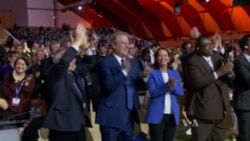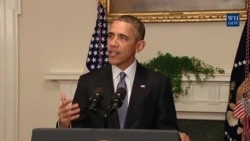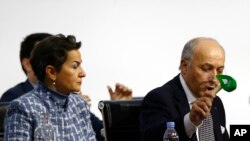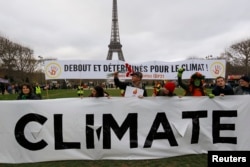Delegates of more than 190 nations meeting in Paris adopted a historic accord Saturday that aims to slow the pace of global warming and for the first time asks all countries to limit their greenhouse gas emissions.
Announcement of the final agreement Saturday evening was greeted with cheers, hugs and prolonged applause at the conference hall in Paris.
The final draft of the agreement was circulated several hours before the meeting concluded, after an all-night work session in which the text was shortened from 43 to 31 pages and simplified.
The agreement aims to keep global temperature increases below two degrees Celsius, provide $100 billion in climate investment to poorer countries, review progress every five years, and peak carbon emissions as soon as possible.
In a statement from the White House Saturday evening, President Obama called the agreement "the best chance we’ve had to save the one planet that we’ve got."
"So I believe this moment can be a turning point for the world," he said. "We’ve shown that the world has both the will and the ability to take on this challenge."
The president also said that while those who oppose taking action to limit carbon emissions say that doing so will "kill jobs," the agreement will actually create "more of the jobs and economic growth driven by low-carbon investment."
Watch: President Obama's statement on the climate agreement
In a tweet, U.S. Secretary of State John Kerry said the deal was "truly a global effort & signals we’re all in this together."
But Senator James Inhofe, the Republican chair of the Senate Environment and Public Works Committee, compared the agreement to the 1997 Kyoto Protocol, which President Bill Clinton signed in 1998 but was never ratified by the U.S. Senate.
"This agreement is no more binding than any other 'agreement' from any Conference of the Parties over the last 21 years. Senate leadership has already been outspoken in its positions that the United States is not legally bound to any agreement setting emissions targets or any financial commitment to it without approval by Congress," Inhofe said.
The deal culminates negotiations that have gone on for years, and is the most wide-ranging climate agreement since the Kyoto accord.
On Saturday night, a day after an original self-imposed deadline, French Foreign Minister Laurent Fabius, in the absence of any last minute objections, lay down a gavel and declared the 31-page document had been formally and unanimously adopted.
“This is a small gavel, but it has done big things,” Fabius said.
Fabius joined and raised hands with U.N. Secretary-General Ban Ki-moon and others in a gesture of triumph and celebration.
The agreement was adopted after a plea by Ban in the final hours of negotiations.
“The time has come to acknowledge that national interests are best served by acting in the global interest and solidarity,” he told delegates earlier Saturday.
Divvy up responsibility
One key issue not addressed in the agreement is how richer countries and poorer countries should divide up responsibility to pay for climate change programs.
Giving the talks momentum was the presence of so many world leaders at the start, with the determination to take centralized, collective action.
On Friday, U.S. President Barack Obama had said, “This is a turning point, that this is the moment we finally determined we would save our planet, is the fact that our nations share a sense of urgency about this challenge and a growing realization that it is within our power to do something about it."
U.S. Secretary of State John Kerry had held round-the-clock meetings to make the agreement happen. He earlier announced a U.S. pledge to double climate investment to about $800 million in the most vulnerable countries.
The draft sets a goal of $100 billion a year in climate financing for poor nations by 2020.
The deal was reached despite opposition led by India, China, Saudi Arabia and Malaysia. They argued industrialized nations should shoulder more of the burden.
These nations’ economies are dependent on fossil fuels and the transition to greener energy will be especially painful for them.
French President Francois Hollande, the conference’s host, called on nations to think collectively.
“An agreement will not be perfect for anyone if they read it only with their interests in mind. But it’s for everyone’s good.”
'Act for humanity'
Hollande called adoption of the draft “a major act for humanity.”
There was some reluctance from African nations, but in the end, they are getting billions of dollars in pledges to fund green energy projects.
France alone committed to spending more than $2 billion.
South African Environment Minister Edna Molewa said her country never expected a perfect agreement. “It’s a give and take situation in the negotiations. And indeed what comes out of here, we will know that some people may not be happy about this, not happy about that, and so forth,” she said. “But we are here."
The final deal falls short of the 2 degree target on slowing global warming and developing nations did not get the compensation they wanted from rich countries for environmental damage, but organizers call it historic and say it likely marks a new era of common, global efforts on climate change.
Lisa Bryant in Paris also contributed to this report.








